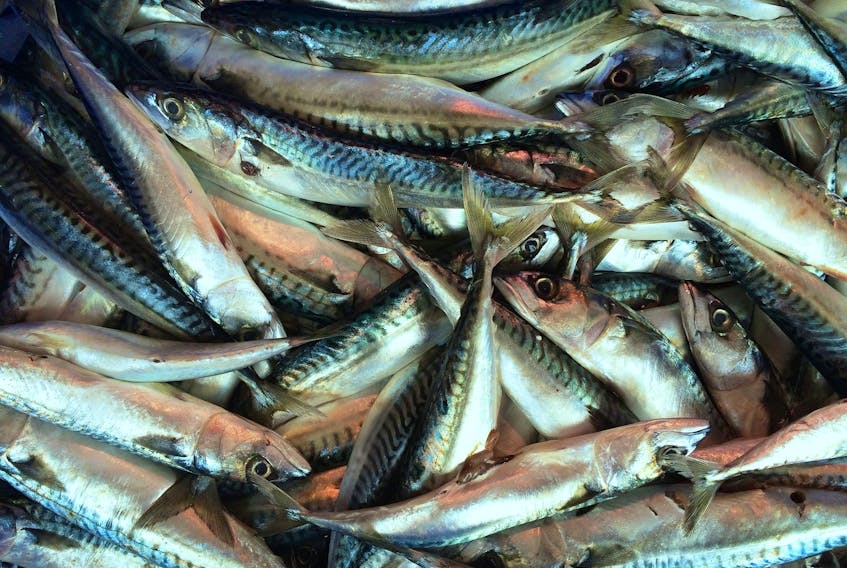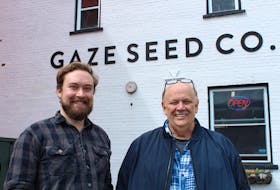Deciding in 2016 to wait until the fall of that year to go fishing for mackerel off the province’s west coast cost the over 65-foot fishing fleet there between $3 million and $4 million, according to information in a recent Federal Court decision.
Mackerel is of higher quality at that time of the fishing season but for vessels fishing for the Barry Group Inc. there was nothing left for them to catch — the Total Allowable Catch (TAC) for 2016 had already been taken during the summer months by the smaller boats in the under 65-foot fishing fleet.
That’s despite a policy indicating that 40 per cent of the TAC was to go to the larger boats.
With the full TAC taken at that time, however, the Department of Fisheries and Oceans (DFO) said it had no choice but to close the mackerel fishery in October of that year.
The Barry Group, holders of commercial fishing licenses which allow them to fish for Atlantic mackerel using purse seine gear on vessels over 65 feet in length, applied to the Federal Court for a judicial review of the DFO decision to close the fishery.
The group argued that DFO had not properly monitored the fishery and that the small boats should have been shut out of the fishery after they had caught 60 per cent of the TAC.
The Federal Court filed a decision on Dec. 14, 2017 dismissing the Barry Group’s application.
“As the applicants have not demonstrated that the decision was made in bad faith or based on irrelevant or erroneous considerations, I find that the decision is reasonable and that this application for judicial review must be dismissed,” Justice Richard Southcott stated.
In the background section of the decision, it states that the Atlantic mackerel fishery is competitive meaning there are no quotas, allocations or catch limits assigned to individual licence holders. There is, however, an Integrated Fisheries Management Plan (IFMP) — a DFO policy in effect since 2007 — that contemplates a sharing of the TAC between the two fleets at 60 per cent for the under 65 fleet and 40 per cent for the over 65 fleet.
The legal significance of the 60/40 split, and whether that split had any application to the 2016 fishery, were principal points of contention in the application.
Another point of note is that between 2007 and 2016, the TAC for the commercial mackerel fishery was lowered from 75,000 tonnes to 8,000 tonnes. Up to 2015, the TAC was never reached.
That changed in 2016 to the surprise of both DFO and the fleets.
“In early October 2016, DFO realized that mackerel landings in the Newfoundland and Labrador region were unexpectedly high,” Southcott’s decision reads. “By Oct. 14, 2016, DFO had identified that landings by the under 65 fleet were approaching the entire 8,000 tonnes TAC.”
The commercial mackerel fishery was subsequently closed.
By closure, the over 65 fleet had caught only 150 tonnes and the Barry Group complained to DFO, then later to the Federal Court.
The Barry Group submitted to the court that the only decision to be made by DFO on Oct. 14, 2016 was how to deal with the interests of the over 65 fleet and whether to allow the (Barry Group) to fish their 40 per cent allocation.
“The thrust of the (Barry Groups’) position is that the decision to close the commercial Atlantic mackerel fishery in essence represents a re-allocation of an entitlement from the over 65 fleet to the under 65 fleet, done in response to a problem faced by DFO of DFO’s own making, because it did not monitor and manage the fishery sufficiently to prevent the under 65 fleet from catching the entire TAC,” the decision read.
“The (Barry Group) takes the position that this sequence of events demonstrates that DFO was ‘asleep at the switch.’ They say that DFO’s catch monitoring methods are inadequate and that it failed to engage in any active monitoring of the mackerel fishery in the 2016 season prior to Oct. 5 and then did not gather data quickly enough, or make a decision quickly enough, to prevent the under 65 fleet from catching the entire TAC. This had the effect of transferring to the under 65 fleet the allocation of 40 per cent of the TAC to which the applicants say they were entitled.”
Related story: Barry Group, Qalipu sign deal to harvest and process western Newfoundland ocean perch
In response, DFO acknowledged that its monitoring methods varied in different regions and that some of the reporting of catch levels was not timely. It disputed the Barry Group’s allegation, however, that it amounted to inadequate management of the fishery.
DFO also stated that when it became aware that catch rates were unexpectedly strong in 2016 it assembled data and closed the fishery once the TAC was reached.
“(DFO) takes the position that the (Barry Groups’) expectation of harvesting 40 per cent of the TAC is based entirely on the IFMP, which the (DFO) characterizes as a policy document that did not confer any legal rights on the (Barry Group),” the court’s decision notes.
“(Barry Group’s) licensing documents do not provide the members of the over 65 fleet with any particular allocation or quota, only a right to participate in the competitive Atlantic mackerel fishery, along with the under 65 fleet, until the entire TAC is caught. Therefore, (DFO) says it managed the fishery in 2016 in a manner which respected the TAC, and the 60/40 split reflected in the IFMP was legally irrelevant to that process.”
Southcott found that the DFO decision to close the fishery was legislative, not administrative, in nature.
He agreed with DFO’s position that the IFMP, and the 60/40 quota allocation reflected therein, represent policy which must be regarded as a non-binding statement of intent and does not give rise to enforceable legal obligations. He said he found that the decision to close the fishery was not made in bad faith or based on irrelevant or erroneous considerations so as to constitute an unreasonable decision.









